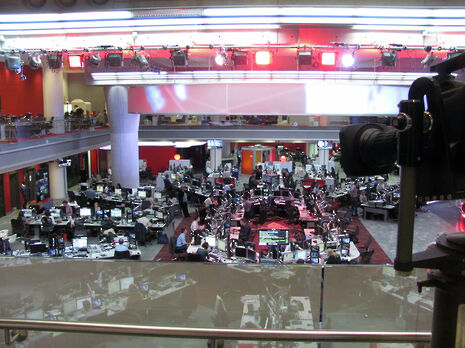The mainstream media isn’t perfect, but we should cherish it
Former head of BBC Television News and current Master of Selwyn College, Roger Mosey, considers the benefits of a strong mainstream media

The mainstream media are having a rough time. The MSM, as it’s become known, is attacked by the President of the United States from the right of politics. Trump tweeted recently: “The FAKE MSM is working so hard trying to get me not to use social media. They hate that I can get the honest and unfiltered message out.” But the MSM isn’t any more loved by many on the left. The Canary website claims “today, a handful of powerful moguls control our mainstream media. As such, its coverage is largely conservative.” Across the globe, the traditional media baronies are under assault – and audiences are moving to digital innovators and creating stories themselves. There is more choice than ever before, more diversity of opinion and more immediacy. You share a breaking story as it happens, and there’s instant comment and reaction. Who needs the MSM?
I declare an interest in that I spent my working life in BBC radio and television, and you can’t get much more mainstream than Today and the News at Ten. But I enthusiastically welcome the digital revolution and the way it has empowered people to have a voice. When I was working on the London Olympics, it was an aim of the project that our own role as editors would be diminished. We would select the programming for BBC One, certainly, but we would make the action available live and unfiltered via digital channels and on tablets and mobiles, with the whole lot on-demand. Interactivity and comment were encouraged too: you could create your own Olympic coverage. And now in news, as well as in sport, the technology allows consumers to select and shape and answer back – which is just the way it should be.
“Consider a future in which the BBC and its equivalents are hobbled and the traditional newspapers have had their business model destroyed by the internet; or wonder about how you’d know what’s accurate if the main source is Twitter”
But I believe that the case for the MSM is even stronger in this digital world – and the argument for public service broadcasting becomes more compelling. It’s because alternative news sources create a new series of problems. For a start, many of them are simply not accurate or true. We see stories whizz through on Twitter which are based on misunderstandings or lies; and the phenomenon of fake news on Facebook is a real one. Either through the naivety of the person creating the post, or the malice of darker forces, some content is actively damaging – and it’s published by internet-based companies who make vast profits out of material they make little attempt to check or control. That’s compounded by the bullying and sexism and xenophobia that can be unleashed on social media, making it a place where anonymous trolls run amok.
There’s research that suggests heavy use of social media can lead to increased anxiety; and it’s a concern that something with such potential to connect people risks creating a more fragmented society. There’s the much-discussed ‘echo chamber’ effect, too. You may only hear the voices that agree with you, either by your own selection or through the way the algorithms work. The effect is that you’re surprised, and even devastated, when the guys you disagree with win an election – and you’ve no understanding of your opponents’ case, just as you are completely alien to them.
By contrast, the best kinds of mainstream media – and I’m thinking here not just of the BBC, but of ITV and Channel 4 and the public broadcasters across Europe and beyond – try to do two vital things. They seek to report the truth, and they put resources into finding out what is happening. It’s reassuring that I find many students still use MSM for precisely that: to check what they’ve heard on social media. The other goal they have is to reflect a plurality of views. You should hear from all parties and from people up and down the country, speaking freely whether you agree with them or not.
This is not to say that the MSM is perfect. It’s plainly not. The big American television networks were too slow to spot the Trump phenomenon: too credulous in reporting his social media rants, and not challenging enough about his character or policies. Here in the UK, political correspondents spend too much time on the obsessions of the Westminster bubble and they prefer chattering about process and personalities rather than policy.
But consider a future in which the BBC and its equivalents are hobbled and the traditional newspapers have had their business model destroyed by the internet; or wonder about how you’d know what’s accurate if the main source is Twitter. This is a vision that is perilously close to reality in some countries, and it’s one that should make us pause before we lash out at the MSM. In Cambridge, more than anywhere, we should know the value of truth and objectivity – and the virtue of taking a considered approach to a turbulent world
 News / Eight Cambridge researchers awarded €17m in ERC research grants27 December 2025
News / Eight Cambridge researchers awarded €17m in ERC research grants27 December 2025 News / Downing investigates ‘mysterious’ underground burial vault 29 December 2025
News / Downing investigates ‘mysterious’ underground burial vault 29 December 2025 Lifestyle / Ask Auntie Alice29 December 2025
Lifestyle / Ask Auntie Alice29 December 2025 Sport / Hard work, heartbreak and hope: international gymnast Maddie Marshall’s journey 29 December 2025
Sport / Hard work, heartbreak and hope: international gymnast Maddie Marshall’s journey 29 December 2025 Interviews / Meet Juan Michel, Cambridge’s multilingual musician29 December 2025
Interviews / Meet Juan Michel, Cambridge’s multilingual musician29 December 2025








